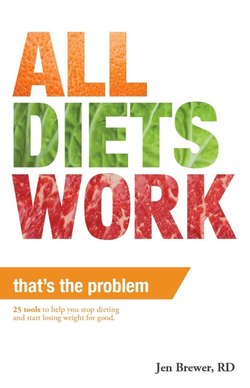Читать книгу All Diets Work, That's the Problem! - Jen Sr. Brewer - Страница 6
На сайте Литреса книга снята с продажи.
Principle 1: Calorie Output Should Exceed Input
ОглавлениеThis is the basic law of weight management: if you take in (eat) more than you work off (through exercise, your basal metabolism, etc.), you will gain weight. If you take in less than you work off, you will lose weight. This can be accomplished in three ways:
1. Eat less (fewer calories).
2. Exercise more.
3. Eat less and exercise more.
The healthiest way to lose weight is to lose at a rate of one to two pounds per week. One pound of fat is equal to 3,500 calories. So if you want to lose one pound of body weight in one week, you will have to find a way to create a 3,500-calorie deficit in your body. If you want to lose two pounds in a week, you will need to create a 7,000-calorie deficit. That breaks down to 500 or 1,000 calories a day, respectively, that you need to shave off of your intake, or work off with exercise.
Every body uses a certain amount of calories each day just to survive. This is called your basal metabolic rate (BMR). Some sources also use the term resting metabolic rate (RMR). There are many different theories and ways to estimate your own basal metabolic rate (see Appendix E to figure out yours). Many factors beyond basic survival will increase the amount of calories your body uses (exercise, working, sickness, etc.).
To figure out the net number of calories your body requires to meet your weight-management goals, just do the math: calculate your basal metabolic rate, adjust it for your activity level (see Appendix E), then subtract the number of calories that correspond with your weight-loss goals (e.g. subtract 500 calories a day to lose a pound a week). This number becomes your daily caloric goal. When you want to eat more, add enough exercise to offset the extra calories.
Many people try to overcomplicate the simple input/output rule, either to make excuses for why they can’t shed the pounds or to sell a particular diet plan. Here are a couple of common myths:
Myth #1: It’s all in the genes.
I have heard this excuse almost more than any other: “I just don’t have the right genes.” “Why does so-and-so get to eat all she wants and never gain a pound, when I gain five pounds just by looking at food?” Or, “My parents have always been big; there’s just nothing I can do about it.”
Yes, there are some people who have been blessed with great genes (and also blessed to fit into great jeans). Though it may not look like it on the outside, their bodies are still working off more calories, due to their high metabolism, and, therefore, they can eat more and still look great (dang it!).
Genetics plays a role in our metabolism, and our upbringing does too — some of our food preferences have to do with what we were served by mom and dad in our early years. Genetics also plays a role in our risk for certain diseases.
You have two choices when it comes to genetics. You can let it overtake you and put you in the victim seat, or you can take the bull by the horns and change what you do have the power to change within your genetic parameters.
When we start working within our own means and not stressing about our genes, we realize how much control we really do have over our lives and our health.
Myth #2: Calories count more at night.
Late-night eating has become taboo in the dieting world. Some diets tout an eating plan that has you stop eating at 6 p.m. (or any random time). Here’s the fact — your body does not have an alarm clock that suddenly sounds at 6 p.m. and states, “I have now passed the calorie-burning phase and will begin the calorie-storing phase, so anything you eat after this point turns into fat.” Yes, this sounds absurd, but that’s essentially what that diet plan is trying to feed you — after you have paid up, of course.
The real, underlying problem with eating at night is that by the time you have eaten throughout the entire day and finished dinner, you are most likely at your calorie limit, if not over it. When you sit down to watch TV and grab a snack, you are overloading your body’s calorie level and that extra gets stored as fat — due to the amount of food that you have already eaten throughout the day, not the specific time at which you are now eating.
The other problem is that at night while watching TV, you don’t normally reach for carrots and Brussels sprouts — you typically go for chips, ice cream, cookies, etc., foods that tend to be higher in fat and calories and lower in nutritional quality, which again leads to an overload of calories for the body.16-20
